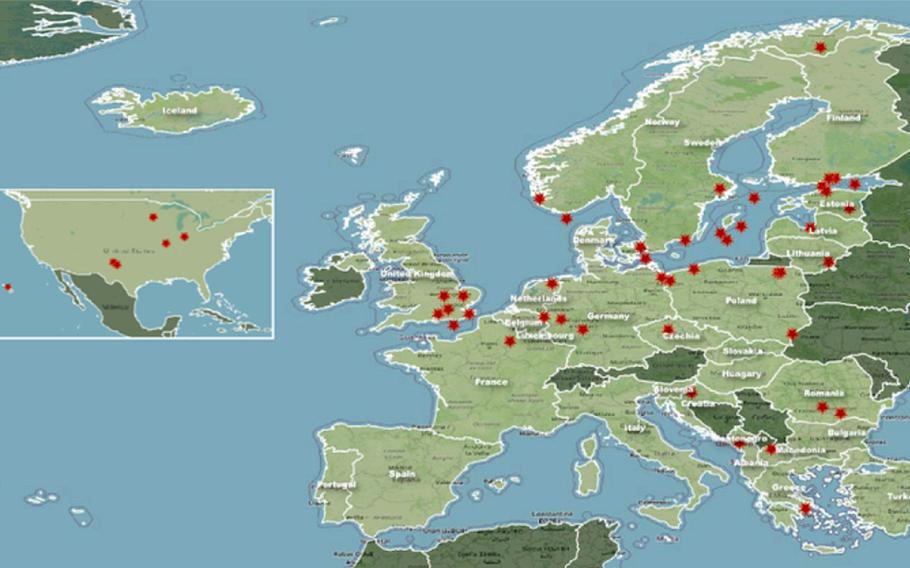
A new report issued by the U.S. Helsinki Commission found about 150 instances of sabotage and other hybrid actions believed to have been carried out by Russia on NATO territory since the Russia-Ukraine war began in February 2022. (Helsinki Commission)
STUTTGART, Germany — Russia is stepping up a clandestine campaign of sabotage and hybrid attacks against the United States and its allies in Europe, as the Kremlin seeks widespread subversion of NATO assistance to Ukraine, according to a new report.
About 150 cases of Kremlin-backed hybrid operations on NATO territory have occurred since Russia launched its full-scale invasion of Ukraine in February 2022, the Helsinki Commission, an independent U.S. government agency, said in a report issued Friday.
The pace has accelerated over the past two years and the Russian efforts go beyond “mere capers” of destabilization, the report said.
“Russia is simultaneously executing a shadow war on NATO to destabilize, distress, and deter the transatlantic alliance from its staunch support of Ukrainian sovereignty,” the report said.
The Helsinki Commission’s chairman, Rep. Joe Wilson (R-S.C.), and co-chairman Rep. Ben Cardin (D-Md.), are selected by the president of the Senate and the speaker of the House of Representatives. They rotate their positions with each new Congress.
The Russian attacks involved four methods: election and information operations, attacks on critical infrastructure, violence campaigns and weaponized migration.
The hybrid campaign has ranged from cyberattacks on train stations that cause scheduling delays to attempted assassinations and terrorism plots, the commission said.
U.S. and allied military bases have been among the targets, according to the report, which noted that in April, German authorities arrested two men who are accused of surveilling the U.S. Army’s base in Grafenwoehr, Germany, as a potential bomb plot target.
The Army base has served as a hub for U.S. efforts to train Ukrainian troops. U.S. European Command headquarters in Stuttgart also has been a target for espionage by operatives suspected of links to Russia, British prosecutors said recently.
In November, U.S. authorities said American defense industrial sites in Europe should step up their security over concerns that Russian saboteurs could target them.
Russia’s hybrid strategy relies on “plausible deniability” and leverages decentralized tactics that outsource operations to low-level cybercriminals and operatives, the report said.
Notable cases include Poland’s arrest in early 2024 of a man who authorities say was recruited by either Russia or its ally Belarus to bomb a paint factory in southwestern Poland.
And in June, the arrest of a man near Paris Charles de Gaulle Airport on suspicion of making bombs disrupted a Russian-orchestrated sabotage plot, the report said.
Meanwhile, mass bomb threats traced to Russian servers are routinely made across the NATO alliance, stretching from the United States to the Baltic states and countries in southern Europe, the report said.
NATO Secretary-General Mark Rutte said Thursday in a speech in Brussels that allies need to get in a “wartime mindset,” ramping up military investments to counter Russia’s aggressive moves.
“Hostile actions against allied countries are real and accelerating,” Rutte said. “These attacks are not just isolated incidents. They are the result of a coordinated campaign to destabilize our societies and discourage us from supporting Ukraine.”
The Helsinki Commission said Russia’s hybrid campaign and war in Ukraine are intertwined and must be dealt with simultaneously.
“Only by confronting Russia’s hybrid warfare head-on and ensuring Ukraine’s victory can NATO effectively deter further Russian provocations,” the commission said.
The report stopped short of detailing what specific countermeasures should be taken against Russia for its hybrid attacks, saying instead that allies should press ahead with efforts to arm Ukraine.
“Restricting aid or failing to meet the urgency of Ukraine’s needs only signals weakness and invites further Russian escalation, both in Ukraine and within NATO’s borders,” the report said.